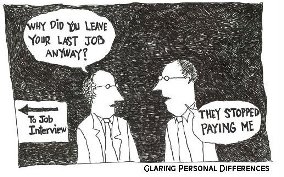It's hard to hire good people in the technology business. I know good people get hired, and many of us work with good people that know their jobs. However it seems there is no shortage of people that complain about the lack of knowledge their co-workers display, and the dismal performance of interviewees. I'm sure the truth is somewhere in the middle, but it does seem that the various methods of attempting to choose the best hire from a group of potential candidates is not the science many people think it is.
"Choose the best person for the job" is a mantra that so many people espouse, but we never have a repeatable, logical method for determining who the best person is, in any industry. Most of us use some type of interview to choose a new employee, with mixed results.
I ran across this piece on "5 signs that you should hire a programmer on the spot" with an emphasis on test performance. I tend to agree with the method used, and if you don't like tests, this isn't a stick-someone-in-a-room-alone-for-two-hours test. Read the comments and you'll understand a bit more about the process.
I also found a rebuttal, that notes there is a need to actually talk to the candidate in depth to understand if they really know their stuff. I also agree with that as a great technique, and one that works really well. It depends on some good senior people in your own organization, and their willingness to assess the candidates without involving themselves in a competition of sorts with the interviewee.
How do I think both of these techniques work well? Because ultimately you are getting to know the person in both cases, interacting with them, and understanding how they feel about the code. You are assessing the candidate as a person you will have to work with, building a bond, and then deciding if this person will fit in well with your culture. You are engaging in a kind of hive-mind-evaluation to see if this person matches with the particular evolution of the Borg inside your company. You need them to mesh. Not be the same, not to agree, not to always approach problems the same way as others, but to to fit into the particular puzzle shaped space that exists for the position.
If they do, things will probably work well. If you bend the edges and force a fit, you are probably just asking to repeat the process much sooner in the future than you might otherwise need to.
Steve Jones
The Voice of the DBA Podcasts
We publish three versions of the podcast each day for you to enjoy.
- Watch the Windows Media Podcast - 27.4MB WMV

- Watch the iPod Video Podcast - 22.0MB MP4

- Watch the MP3 Audio Podcast - 4.4MB MP3


The podcast feeds are available at sqlservercentral.mevio.com. Comments are definitely appreciated and wanted, and you can get feeds from there. Overall RSS Feed: ![]() or now on iTunes!
or now on iTunes! ![]()
Today's podcast features music by Everyday Jones. No relation, but I stumbled on to them and really like the music. Support this great duo at www.everydayjones.com.
You can also follow Steve Jones on Twitter:




